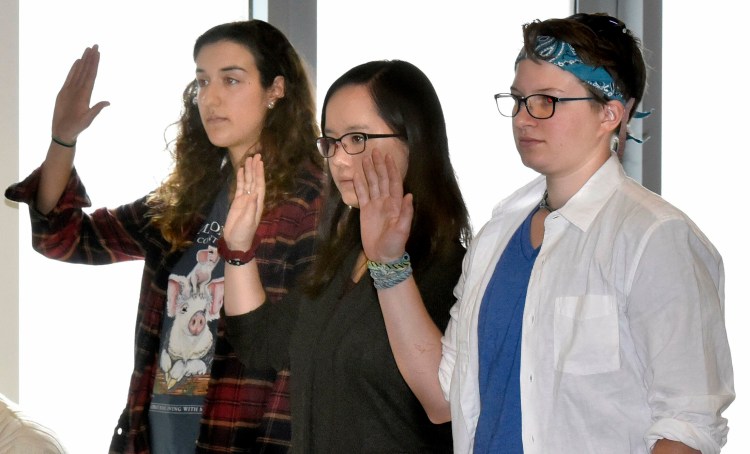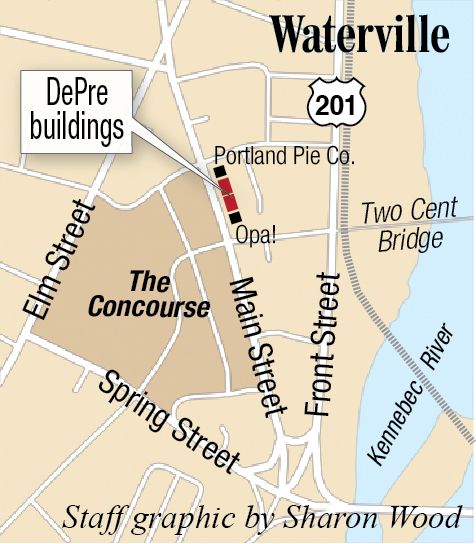WATERVILLE — Colby College students whose voting rights were challenged confronted Mayor Nick Isgro on Tuesday, saying they felt hurt and alienated by his questioning of their right to vote and asking that he represent them as he does other city residents.
“I love Waterville and I feel incredibly lucky to be a resident of this city,” Colby student Maggie White told Isgro at Tuesday’s City Council meeting. “As a resident, I am one of your constituents. I am deeply hurt by your choice to alienate and disenfranchise me instead of representing me the same way you would any of the other residents in the town you govern. I am here tonight to ask you to use the power of your office to advocate for the people of your city. I am one of these people, and I am here and eager to work together for the good of Waterville.”
White and Colby student Noa Gutow-Ellis stood before a packed Chace Community Forum room, four days after the Waterville Registration Appeals Board voted unanimously to uphold their voting rights and those of dozens of other students and Colby faculty and staff members.
Residents Cathy and Jonathan Weeks and Shaun Caron challenged their rights to vote and the board held hearings for a day and a half, during which both sides presented their cases.
The Appeals Board decision represents the latest step in attempts to resolve a conflict over the outcome of a referendum on whether to ban plastic shopping bags and a simultaneous effort to challenge voter registrations.
Isgro opposed the plastic bag ban, which voters approved Nov. 6. He also questions the rights of college students who come to Waterville from other states to vote in the city.
Gutow-Ellis took Isgro to task Tuesday about a Facebook message he posted May 2 that questions college students’ right to vote.
“Mayor Isgro wrote on Facebook, yet again, ‘Is it moral or ethical for college students from other states to be allowed to vote in local races, like city council and mayor, and on local referendum and city policies?'” Gutow-Ellis said.
Gutow-Ellis said she loves Waterville, has lived here nearly four years and is not sure what it would take to be considered a “full member of our city.”
“Instead of shaming us on Facebook, I wish you, too, would make an effort to get to know the Waterville citizens and Colby community members that you absolutely represent,” she told Isgro. “I have made every effort to get to know and appreciate my Waterville neighbors, and it would be appreciated if you would extend the same courtesy to us.”
She thanked the Appeals Board and City Clerk and Registrar Patti Dubois for their patience and diligence at the hearings and said that while she felt heartened by the outcome she is “disappointed in the representation of our city.”
Isgro did not respond to White and Gutow-Ellis’ comments at the meeting. Email and voice mail messages left Wednesday for Isgro, specifically asking what he thought about their comments, were not returned immediately.
Resident Stu Silverstein, who supported the plastic bag ban, wanted to know just how much the voting challenge will cost the city.
“Why should the city have to pay for these frivolous challenges?” he asked.

The City of Waterville earned revenue for storing empty dumpsters at the landfill off Webb Road in August 2017. The City Council took the first vote on approving leases to a solar energy developer who will site solar panels in the city’s landfill and at the former Runser property on Webb Road on Tuesday. File photo by Elise Klysa
Though no one answered his question Tuesday, City Solicitor William A. Lee III, who represented the Appeals Board at the hearings, estimated last week that the amount could reach $25,000. Contacted Wednesday, Lee said he planned to develop a total of the costs.
Meanwhile, after the Colby students spoke Tuesday, Cathy Weeks and resident Julian Payne defended the voter challenge, citing reasons including that some people had voted in the wrong ward, using post office box numbers as their addresses.
Those who defended their right to vote said students have boxes in Colby buildings where they receive their mail, but they are not actual post office boxes.
In other matters Tuesday, the council took first votes to lease the landfill and former Runser properties on Webb Road to a company that wants to install solar arrays there and would pay the city thousands of dollars in annual per-acre rental fees and equipment taxes.
The landfill installation could produce 20 megawatts and the former Runser property installation 5 megawatts, according to City Manager Michael Roy. The solar energy would go out of state.
The city would collect two forms of revenue from the leases with a company called hep energy USA LLC: a per-acre rental amount for leasing the property and taxes on the equipment installed, according to Roy.
Roy said the landfill property is about 130 acres and the former Runser property 28 acres. The city would receive $425 per acre, per year, for the leases. He was not sure how much the city would receive in equipment taxes, as it is not yet known what model and size the solar panels would be. However, Roy indicated the amount would be substantial.
“The amount of taxes for the panels is going to be way, way more than the rental,” he told the council.
The council, which voted 6-1 to lease the properties, must take one more vote on each lease to finalize them.
Councilor Phil Bofia, R-Ward 2, was the lone opponent, saying he thought the city should table the matter and continue negotiating to allow the city to get some of the solar power for schools and other municipal buildings.
“We as a city, we can look at this lease and provide some energy for possibly offsetting the cost of our schools’ electricity consumption and maybe some other municipal buildings,” Bofia said.
Mayor Nick Isgro said the city has been working on the issue for three years, and no one is going to want to do business with the city if it pulls the rug out from under the business at the last minute. He said the project being proposed is a separate type of project from what Bofia suggested and is subject to specific rules and regulations.
A motion by Bofia to table failed for lack of a second. Council Chairman Sydney Mayhew, R-Ward 4, said the proposal will benefit the city and moving forward with a lease agreement is a no-brainer.
“I say we pass this ASAP,” he said.
Councilors Erik Thomas, D-Ward 7, Mike Morris, D-Ward 1, Jay Coelho, D-Ward 5, and Winifred Tate, D-Ward 6, agreed.
“I think this is going to be a win-win for everybody,” Morris said.
But Ward 2 resident Kristen Price objected to the amount of $425 per acre rental fee, saying it is a small amount compared to how much the company will gain, though Roy said that is the amount recommended by a review appraisal, and the town of Fairfield is charging that amount for a similar project.
“I don’t think you could find anyone who would pay $425 for a garbage dump that has been sitting there since 1993,” he said.
Isgro said he is not a real estate expert but has to trust the professionals, and those wanting to table the issue had not shown any actual proposals backed by data.
Meanwhile, Lee, the city solicitor, recommended that the council, as part of its vote, include in the contract a guarantee that if the project goes bankrupt and the company does not remove the solar panels and other debris, the city be guaranteed $515,000 for the landfill property and $125,000 for the former Runser property. Thomas made a motion to that effect and it passed 7-0.
Also on Tuesday, the council voted 7-0 to approve a resolution declaring June 2 Central Maine Pride Day and say the city strives to be a community that is welcoming and supportive of its members, regardless of race, gender, age, sexual orientation and expression. The city, according to the resolution, supports the legal nondiscrimination protections for LGBTQ Mainers passed in 2005 as only one of 20 states in the nation to include protections against discrimination based on sexual orientation, gender identity and gender expression in employment, housing, education, credit and public accommodations.
The council voted to approve a $480,089 contract with Affinity LED Lighting of Dover, New Hampshire, to install new LED streetlights throughout the city. As part of the vote, the council approved spending $109,049 to reimburse Central Maine Power Co. for the purchase of that company’s existing 1,492 street lights in the city. The project total is $589,138. The projected payback period for the project is 2.5 years.
The council also took final votes to approve a tax increment financing plan for 155 and 165 Main St. downtown, which are owned by the DePre family.
The DePres want to renovate the two downtown buildings to the tune of $10.5 million. The council last month voted to amend the existing downtown tax increment financing district to remove the buildings from the district and allow a new district to be developed for them, and another vote is needed.
Kennebec Realty Partners, owned by Thomas DePre Sr. and his sons, Thomas DePre Jr. and Justin DePre, plan to renovate 52,200 square feet on four levels of the two adjoining buildings. The building at 155 Main St. has two stories; the building at 165 Main St. has three stories. Plans call for an 11,000-square-foot craft brewery and 5,200 square feet of function space in the basement, plus a bowling alley, a restaurant and a brew pub. The DePres hope to develop 155 Main St. into office space on the second floor, as well as market-rate apartments on the second and third floors of the building at 165 Main St. A new roof and windows, as well as an elevator, are planned.

The City of Waterville is in the process of replacing the two slides shown here in June 2018 and rebuilding the municipal pool. The council was to take a final vote to spend $48,250 for preliminary engineering work for the second phase of renovations to the Alfond Municipal Pool on North Street. Morning Sentinel photo by David Leaming
The council also took a final vote to spend $48,250 for preliminary engineering work for the second phase of renovations to the Alfond Municipal Pool on North Street. Councilors voted April 16 to take a first vote to authorize Roy to sign a contract with Weston and Sampson for the engineering work.
In 2016, the city hired the company to provide a full assessment of the pool facility because it was deteriorating. The first phase involved rebuilding the slide structure, which was 20 years old. Money for the replacement came from a $570,000 grant from the Harold Alfond Foundation and funds from the city pool reserve account. Engineering for the second phase will cover the main pool, wading pools, spray pad, filter building and bathhouse. The city hopes to start repair work in the fall of next year and anticipates having information available soon to apply for a grant for that project.
The council also voted to create a committee to study the city’s property maintenance ordinance and return to the council with recommendations for changes and improvements. The city’s ordinance was adopted in 2007 and has not been reviewed comprehensively since then. Also Tuesday, councilors voted to adopt a food sovereignty ordinance. The ordinance would help ensure that residents have unimpeded access to local food or food products and that government regulation of direct producer-to-consumer goods is reduced, according to the proposal.
Send questions/comments to the editors.





Comments are no longer available on this story